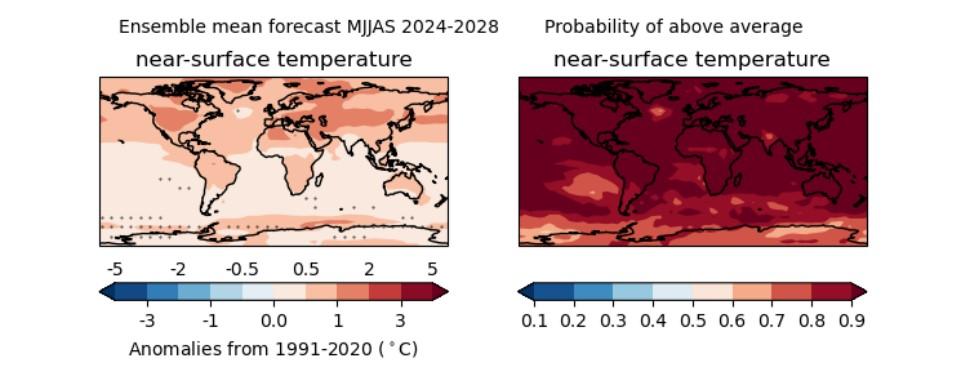Global Annual to Decadal Climate Report
World Meteorological Organization (WMO) releases the Global Annual to Decadal Climate report, aiming to analyze future global temperature forecasts and focus on the trajectory of climate change from 2024 to 2028.
World Meteorological Organization believes that 2023 is the hottest year in the past 174 years, with the global average surface temperature 1.40 degrees Celsius higher than the average temperature from 1850 to 1900. Global temperatures are likely to continue to maintain record levels from 2024 to 2028, far exceeding values of past thirty years.
Related Post: World Meteorological Organization Releases 2023 Global Climate Report
Global Annual to Decadal Climate Prediction
World Meteorological Organization’s predictions are based on WMO Lead Centre for Annual to Decadal Climate Prediction, which includes 15 different climate change research institutions. The Climate Prediction center used data from 1960 to 2018 to establish models and made predictions based on actual data from the end of 2023.
The global average temperature from 2024 to 2028 will be between 1.1 degrees Celsius and 1.9 degrees Celsius, with a 47% probability of the average temperature being higher than 1.5 degrees Celsius in the pre industrial stage (compared to 32% last year). The likelihood of an average temperature exceeding 2023 for at least one year within the next five years is 86%, and the likelihood of an average temperature exceeding the past five years is 90%. By reviewing previous historical data, World Meteorological Organization believes that these prediction methods have high accuracy.

Regional Annual to Decadal Climate Prediction
World Meteorological Organization believes that in the next five years, the average summer (from May to September) temperature is likely to be higher than the average temperature between 1991 and 2020, with temperatures in the northern hemisphere continuing to rise. Due to abnormal temperature increases and low-pressure phenomena, the likelihood of tropical cyclone activity in the next five years will increase. In the next five years of winter (November to March), the precipitation in high latitude regions worldwide will be higher than average, while the precipitation in low latitude regions will decrease, which is consistent with the results of climate warming.
The report includes predictions related to sea ice concentration for the first time to improve the accuracy of climate predictions. It shows that the amount of sea ice in the Arctic will significantly decrease in the next five years, with higher accuracy in predictions in the North Atlantic region. Multiple models have shown that the amount of sea ice in Antarctic will sharply decrease over next five years, but this may be due to the weak consistency of the models in predicting outliers.
World Meteorological Organization believes that the report will provide guidance for Regional Climate Centers, Regional Climate Outlook Forums, and National Meteorological and Hydrological Services to encourage them to interpret and develop regional climate prediction reports.
Reference:





